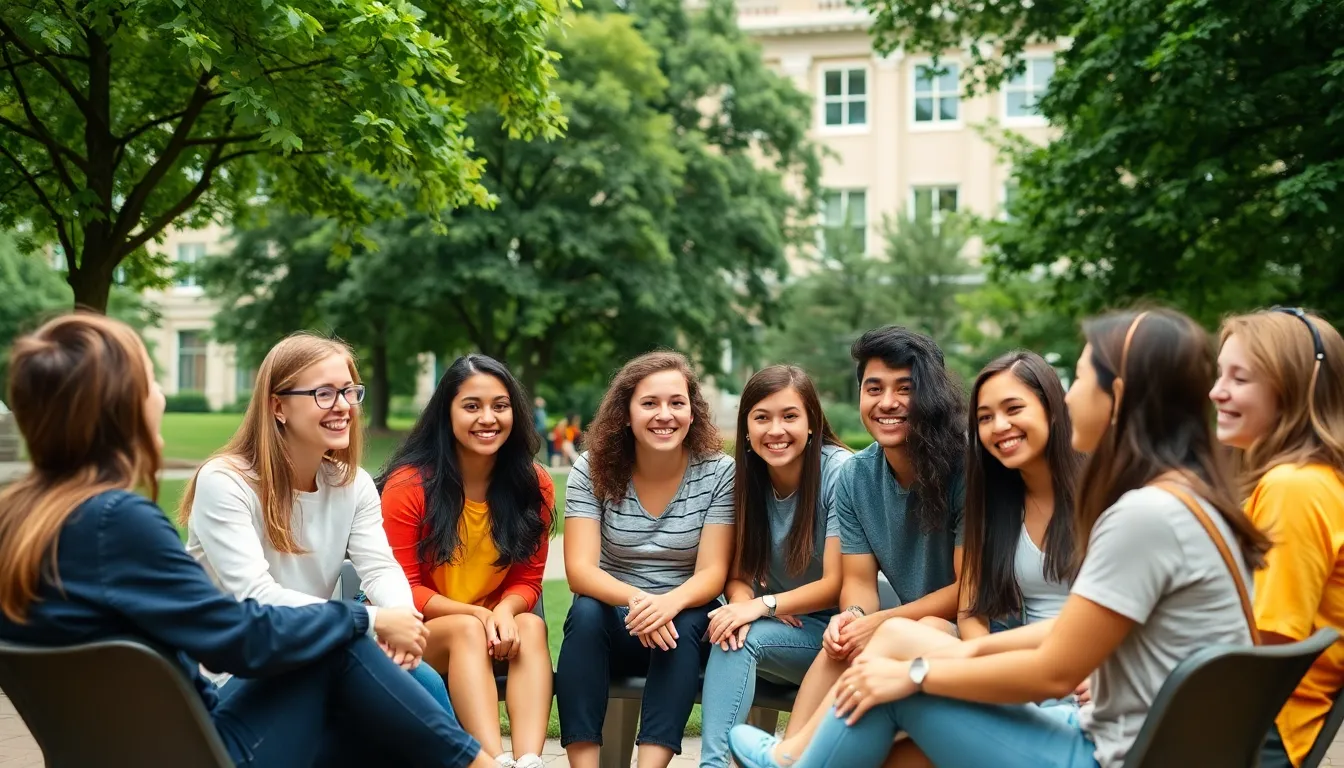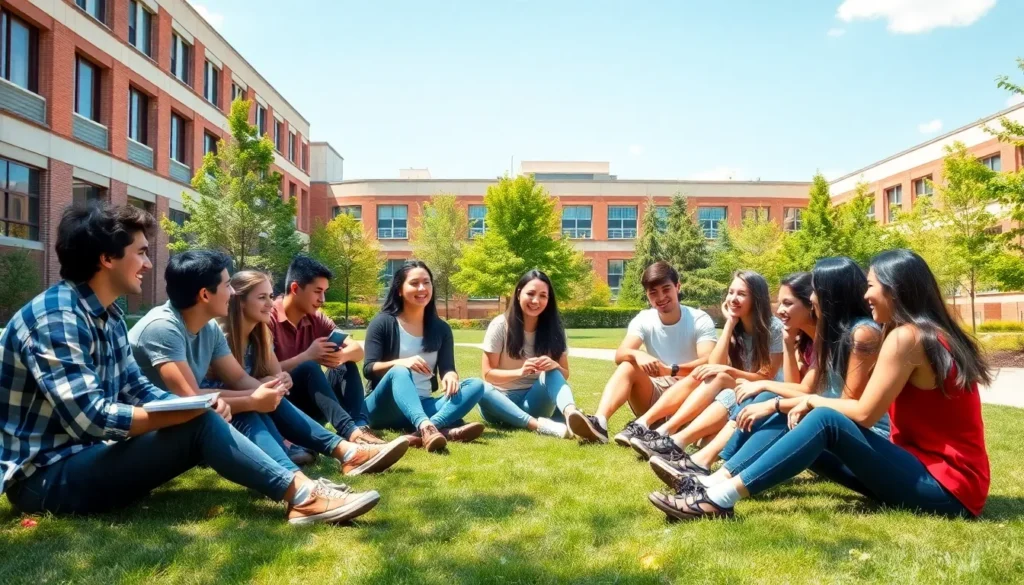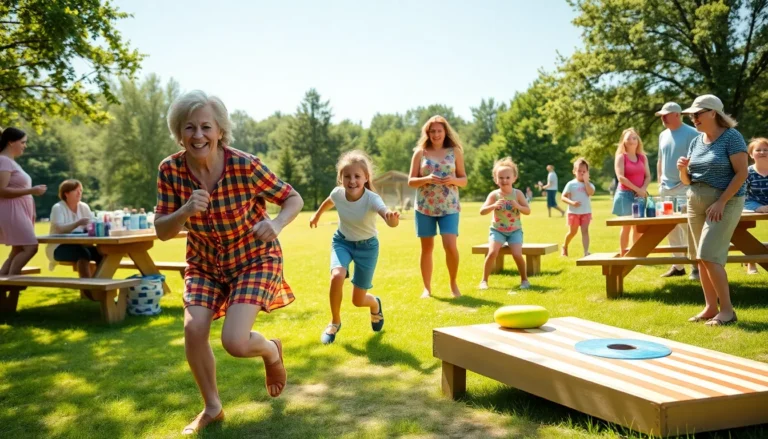Table of Contents
ToggleCollege orientation: the magical rite of passage that turns wide-eyed freshmen into slightly less wide-eyed college students. It’s the moment when they trade their high school hallways for bustling campus quads and learn that the dining hall serves pizza for breakfast—every day. As they navigate through icebreakers and campus tours, they’ll discover that college isn’t just about classes; it’s about finding the best coffee spots and perfecting the art of procrastination.
But orientation isn’t just a fun-filled adventure; it’s a crucial step in setting the stage for success. From meeting future roommates to understanding campus resources, this experience lays the groundwork for a fulfilling college journey. So buckle up, because the whirlwind of new experiences is just getting started, and it’s bound to be a ride filled with laughter, learning, and maybe a few late-night study sessions.
Understanding College Orientation
College orientation serves as a critical introduction for freshmen. Many students face significant changes as they transition from high school to college life.
What Is College Orientation?
College orientation is an organized program designed to help new students adapt to their academic and social environments. Freshmen learn about course registration, campus policies, and important deadlines. They also receive vital information about clubs, organizations, and extracurricular activities. Orientation often includes campus tours to familiarize students with libraries, dining halls, and classrooms. Peer interactions during orientation foster connections, creating opportunities for friendships early in the college experience.
Purpose of College Orientation
The purpose of college orientation centers on easing the transition to college. Orientation provides essential resources to help students navigate academic challenges. Building community among students also plays a key role in enhancing the overall college experience. Through interactive sessions and workshops, participants develop skills for time management and effective studying. Orientation helps students familiarize themselves with campus resources like counseling and student support services. Ultimately, the event lays a strong foundation for future success in college and beyond.
Benefits of College Orientation

College orientation provides crucial advantages for freshmen as they transition into their new academic environment. Students gain insights into what to expect and how to thrive during their college years.
Academic Support and Resources
Academic support services become readily available during college orientation. Students learn about tutoring centers, writing workshops, and library resources that assist with coursework. They also familiarize themselves with course registration procedures and degree requirements. Each session includes details on academic calendars and essential deadlines. Additionally, workshops covering time management and effective study techniques help students prepare for challenges ahead. Resources designated for academic help empower freshmen by ensuring they know where to seek assistance when needed.
Social Connections and Networking
Social connections are vital during college orientation. New students engage in icebreaker activities designed to promote networking and friendship. They meet peer mentors who share experiences and guide them in integrating into campus life. Orientation also introduces various student organizations and clubs that cater to diverse interests and hobbies. Each connection formed during this time enriches their college experience. Building these relationships supports personal growth and enhances students’ sense of belonging in their new environment.
Preparing for College Orientation
Preparing for college orientation ensures a smooth transition into college life. Familiarity with what to expect can alleviate anxiety and boost confidence.
What to Expect
Orientation typically includes a mix of informational sessions and interactive activities. Students receive details about course registration, campus services, and essential policies. They can explore campus through guided tours, which highlight libraries, dining halls, and classrooms. Engaging in icebreaker activities fosters friendships with fellow students. Often, new students meet peer mentors who share tips for adapting to academic and social challenges. Lastly, opportunities to join clubs and organizations arise during orientation, allowing individuals to connect with like-minded peers.
Packing Essentials
Packing wisely can enhance the orientation experience. Students should bring necessary documents such as identification, health insurance cards, and class schedules. Personal items including notebooks, writing utensils, and a laptop contribute to preparedness for academic tasks. Comfort-oriented clothing and shoes allow for ease during campus tours and activities. It also helps to include any essential personal items, like toiletries and bedding supplies, for dorm living. Lastly, a phone charger and backpack ensure readiness for long days on campus.
Navigating the College Orientation Experience
College orientation includes various activities designed to engage students and ease their transition. Freshmen participate in interactive workshops that cover essential skills like time management and effective studying. Activities range from icebreakers to group discussions, fostering connections among peers. Students gain firsthand experience in navigating campus resources through guided tours. These engaging events set the tone for an active college life and instill confidence in new students.
Engaging Activities and Workshops
Workshops during orientation focus on vital skills needed for academic success. Freshmen learn about strategies for managing their time more efficiently. Examples include prioritizing tasks and setting achievable goals. Interactive activities stimulate networking, with peers forming friendships that last throughout their college years. Engaging materials and enthusiastic facilitators enhance the learning experience, ensuring students leave with valuable insights and connections.
Meeting Faculty and Staff
Meeting faculty and staff is a crucial component of college orientation. New students receive guidance from professors who introduce their teaching styles and course expectations. Engaging with academic advisors provides insights into degree requirements and academic resources. Conversations with staff highlight available support services, such as tutoring and counseling. These encounters foster a sense of belonging and reassure students that help is readily accessible throughout their academic journey.
College orientation plays a crucial role in shaping the experiences of new students. By providing essential information and fostering connections it equips freshmen with the tools they need to thrive. The blend of academic guidance and social interaction creates a supportive environment where students can build lasting friendships.
As they navigate their new surroundings and engage in various activities students gain confidence and clarity about their college journey. This foundational experience not only eases the transition but also encourages personal growth and exploration. Embracing the opportunities presented during orientation can set the stage for a fulfilling and successful college career.




